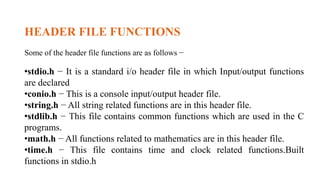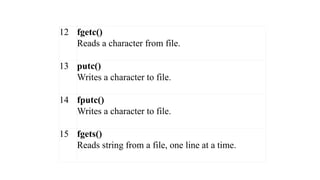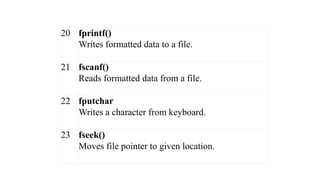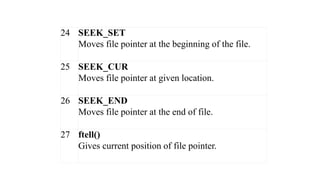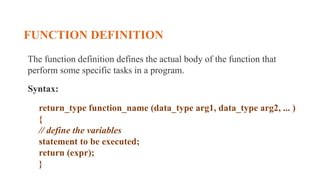C-Programming C LIBRARIES AND USER DEFINED LIBRARIES.pptx
- 1. C LIBRARIES AND USER DEFINED LIBRARIES
- 2. • C Standard library functions or simply C Library functions are inbuilt functions in C programming. • The prototype and data definitions of these functions are present in their respective header files. • To use these functions we need to include the header file in our program. C STANDARD LIBRARY FUNCTIONS
- 3. For example, If you want to use the printf() function, the header file <stdio.h> should be included. #include <stdio.h> int main() { printf("Catch me if you can."); } If you try to use printf() without including the stdio.h header file, you will get an error.
- 4. • Library functions are built-in functions that are grouped together and placed in a common location called library. • Each function here performs a specific operation. We can use this library functions to get the pre-defined output. • All C standard library functions are declared by using many header files. These library functions are created at the time of designing the compilers. • We include the header files in our C program by using #include<filename.h>. Whenever the program is run and executed, the related files are included in the C program.
- 5. HEADER FILE FUNCTIONS Some of the header file functions are as follows − •stdio.h − It is a standard i/o header file in which Input/output functions are declared •conio.h − This is a console input/output header file. •string.h − All string related functions are in this header file. •stdlib.h − This file contains common functions which are used in the C programs. •math.h − All functions related to mathematics are in this header file. •time.h − This file contains time and clock related functions.Built functions in stdio.h
- 6. Sl.N o Function & Description 1 printf() This function is used to print the all char, int, float, string etc., values onto the output screen. 2 scanf() This function is used to read data from keyboard. 3 getc() It reads character from file. 4 gets() It reads line from keyboard.
- 7. 5 getchar() It reads character from keyboard. 6 puts() It writes line to o/p screen. 7 putchar() It writes a character to screen.
- 8. 8 fopen() All file handling functions are defined in stdio.h header file. 9 fclose() Closes an opened file. 10 getw() Reads an integer from file. 11 putw() Writes an integer to file.
- 9. 12 fgetc() Reads a character from file. 13 putc() Writes a character to file. 14 fputc() Writes a character to file. 15 fgets() Reads string from a file, one line at a time.
- 10. 16 f puts() Writes string to a file. 17 feof() Finds end of file. 18 fgetchar Reads a character from keyboard. 19 fgetc() Reads a character from file.
- 11. 20 fprintf() Writes formatted data to a file. 21 fscanf() Reads formatted data from a file. 22 fputchar Writes a character from keyboard. 23 fseek() Moves file pointer to given location.
- 12. 24 SEEK_SET Moves file pointer at the beginning of the file. 25 SEEK_CUR Moves file pointer at given location. 26 SEEK_END Moves file pointer at the end of file. 27 ftell() Gives current position of file pointer.
- 13. 28 rewind() Moves file pointer to the beginning of the file. 29 putc() Writes a character to file. 30 sprint() Writes formatted output to string.
- 14. 31 sscanf() Reads formatted input from a string. 32 remove() Deletes a file. 33 flush() Flushes a file.
- 15. USER-DEFINED FUNCTION • A user-defined function is a function written by the user to write any program code and execute specific actions. • These user-defined functions can be modified and execute according to the requirement of the programmer. • A programmer can change the user-defined function, but these functions are not defined in the C header files. • A user-defined function is made up using the function declaration, function definition, and the function call.
- 16. FUNCTION DEFINITION The function definition defines the actual body of the function that perform some specific tasks in a program. Syntax: return_type function_name (data_type arg1, data_type arg2, ... ) { // define the variables statement to be executed; return (expr); }
- 17. FUNCTION CALLING • After defining the function definition, we need to call the defined function in a program to execute its tasks. • However, a function can be called multiple times by writing the function name followed by arguments lists. function_name(arg1, arg2, ...) Syntax: Here, arg1, arg2 are the actual arguments passed to the function_name.
- 18. FUNCTION DECLARATION • The function declaration defines the function name, return type and the passed arguments in it. • A function definition is always defined outside of the main() function in any C program. Syntax: return_type function_name ( data_type arg1, data_type arg2, ..) ;
- 19. LIBRARY FUNCTION • C programming language provides some library functions to perform some predefined tasks. • These functions are also called the built-in or predefined function in the C header files whose meaning cannot change. • When we use these functions on any program, we call the function name with appropriate header files because these functions are defined inside the header files. • In other words, we did not require to write the complete code to perform a specific task. For example: printf(), scanf(), getch(), etc., are the predefined library functions.




